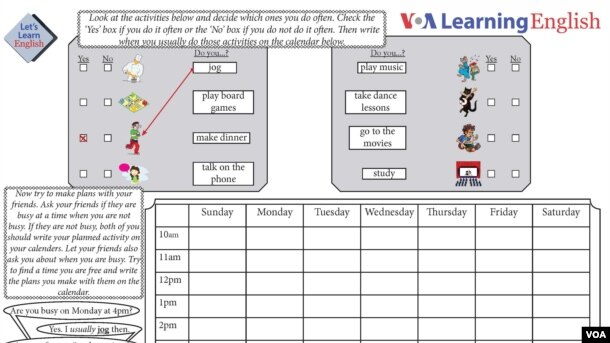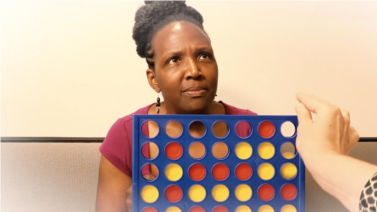Summary
Anna has to walk to work because the Metro is closed. She calls to tell her boss she is late. Ms. Weaver wants her to come and talk about a new assignment. What will Anna do?Speaking
Learn to pronounce the new words for this lesson and the months of the year. Learn about using which for offering choices and every or next with time words.Pronunciation
In this video, learn how English speakers say the second month of the year.Conversation
Anna: Hi there! Summer in Washington, D.C. is hot and sunny. I
always ride the Metro to work. Riding the Metro is cool and fast. But
today it’s closed. So, I am walking to work.
(On the phone) Ms. Weaver, I am late this morning. The Metro is closed. So, I am walking to work.
Caty: That’s too bad. It’s really hot today.
Anna: Yes it is.
Caty: When you arrive, please come to my office. I have important news to tell you.
Anna: Of course. Good-bye. My boss has news for me. The question is: Is it good news or bad news?
(At work)
Anna: Hello, Ms. Weaver.
Caty: Anna, I have good news and I have bad news. Which do you want to hear first?
Anna: The good news. No … okay, the bad news.
Caty: The bad news is you are not good at reading the news.
Anna: Oh. I am very sorry to hear that.
Caty: So, starting next month you will not read the news.
Anna: Next month is July. You are firing me in July.
Caty: No. I am not firing you in July … or in August or in September. That is the good news.
Anna: Okay. You are not firing me. I am not reading the news. What will I be doing?
Caty: Well, you are good at asking questions. You are good at
talking to people. You are good at showing your feelings. And you are
great at being silly.
Anna: Thank you, Ms. Weaver. But what does all that mean?
Caty: I have a new assignment for you! Your skills are perfect for a new show … a children’s show.
Anna: A children’s show ... That is awesome! When do I start?
Caty: You start next month. Start thinking of ideas for the show.
Anna: I have tons of ideas! I can show children what it’s like in outer space ...
Caty: Great …
Anna: … or in the deep, dark ocean …
Caty: Those are great ideas, Anna. Please go think of more … at your desk.
Anna: Yes. What other things can I show them? Mt. Everest! Everyone has different skills. You have skills. I have skills. The important thing is to know what you are good at. Until next time!
Writing
What are your skills? Do you use them at work or at school? Tell us about a couple of skills you have. Write to us by email or in the Comments section. Click on the image below to download the Activity Sheet and practice with a friend.
Activity Sheet - Lesson 19
Learning Strategy
Learning Strategies are the thoughts and actions that help make learning easier or more effective.The learning strategy for this lesson is Summarize. In this week's video, you hear Ms. Weaver tell Anna, "Well, you are good at asking questions. You are good at talking to people. You are good at showing your feelings. And you are great at being silly." Anna does not understand why Ms. Weaver is telling her about her skills. She asks, "But what does all that mean?"
In answering the question, Ms. Weaver summarizes, "I have a new assignment for you! Your skills are perfect for a new show … a children’s show." When we summarize
we tell a story or report on information in fewer words. We tell the
most important information and do not include many details. Summarizing helps us remember new information and practice using new words.
How do you summarize when learning English? Write to us in the Comments section or send us an email. Teachers, see the Lesson Plan for more details on teaching this strategy.
Quiz
Listen to short videos and test your listening skills with this quiz.______________________________________________________________
New Words
arrive - v. to come to or reach a place after traveling
assignment - n. a job or duty that is given to someone
child - n. a young person (plural: children)
closed - adj. not operating or open to the public
deep - adj. having a large distance to the bottom from the surface or highest point
everyone - pron. every person; everybody
fire - v. to dismiss (someone) from a job
idea - n. a thought, plan, or suggestion about what to do
mean - v. to cause or result in (something)
month - n. any one of the 12 parts into which the year is divided
Mt. Everest - n. a mountain in Asia; it is the highest mountain in the world
ocean - n. the salt water that covers much of the Earth's surface
other - adj. used to refer to the one person or thing that remains or that has not been mentioned
outer space - n. the region beyond the Earth's atmosphere in which there are stars and planets
perfect - adj. having all the qualities you want in that kind of person or situation
silly - adj. playful or funny
skill - n. an ability to do something that comes from training, experience, or practice
ton n. informal: a large amount; in the US, a ton is a unit for measuring weight that equals 2,000 pounds (907 kilograms)

